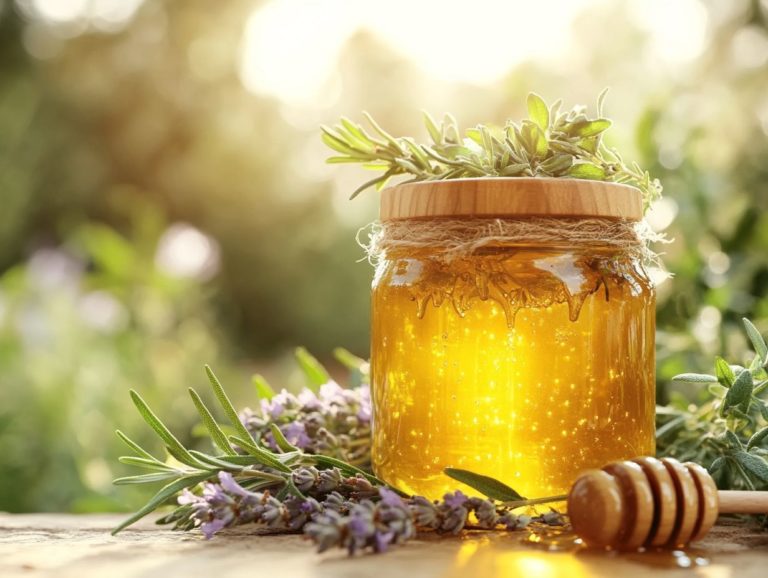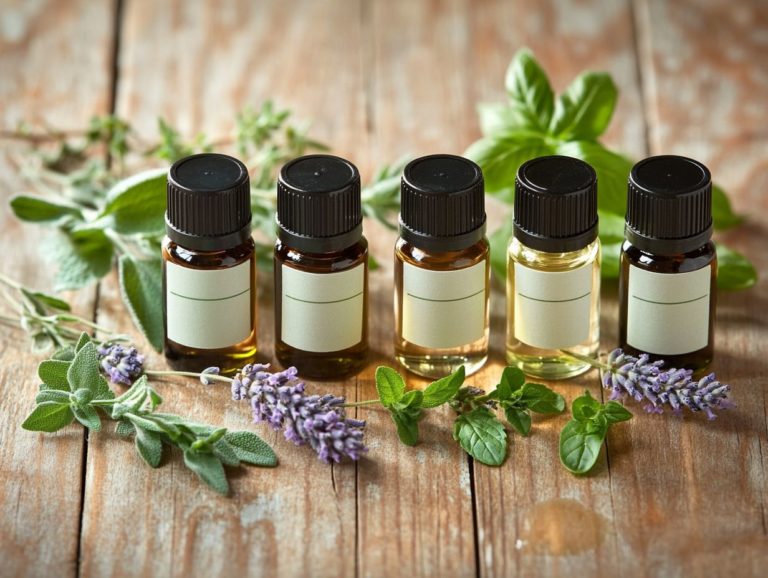Herbal Remedies for Skin Conditions
Exploring the realm of herbal remedies presents a sophisticated, natural alternative for managing various skin conditions.
This article will define herbal remedies while delving into their benefits and limitations, providing you with a comprehensive understanding.
Uncover effective treatments for common issues such as acne, eczema, and psoriasis, and learn practical methods for their application.
Key precautions will also be emphasized, including potential interactions with medications, ensuring you navigate this path safely.
If you’re looking for natural solutions or just curious, this guide has something exciting for you!
Contents
- Key Takeaways:
- Overview of Herbal Remedies for Skin Conditions
- Common Skin Conditions and Herbal Remedies
- How to Use Herbal Remedies for Skin Conditions
- Precautions and Side Effects
- Frequently Asked Questions
- What are herbal remedies for skin conditions?
- What are some common types of herbal remedies for skin conditions?
- Are herbal remedies safe for all skin types?
- Can herbal remedies completely cure skin conditions?
- What are the benefits of using herbal remedies for skin conditions?
- What precautions should be taken when using herbal remedies for skin conditions?
Key Takeaways:

- Herbal remedies are plant-based treatments for skin conditions.
- They offer natural alternatives to traditional medicine but can have limitations.
- Always consult a healthcare professional before starting herbal treatments.
Overview of Herbal Remedies for Skin Conditions
Herbal remedies have been important in skin care for a long time. They provide natural solutions for skin issues like acne, eczema, and inflammation. These treatments often harness the power of diverse plant extracts and essential oils think chamomile, turmeric, calendula, neem, and aloe vera each renowned for their anti-inflammatory and soothing properties.
By diving into the active ingredients and their clinical applications, you can craft effective skin care routines that not only promote healing but also elevate your overall skin health, paving the way for a beautiful complexion that truly reflects your well-being.
What are Herbal Remedies?
Herbal remedies are natural solutions sourced from plants. They are rooted in centuries of traditional medicine and offer therapeutic properties tailored to various health issues, including skin conditions.
These remedies harness the rich potential of botanical ingredients. Ingredients like aloe vera soothe and hydrate, making them excellent for treating burns and irritations. Chamomile is another gem, known for its anti-inflammatory and calming effects, which help alleviate redness and sensitivity.
Other active ingredients, like tea tree oil, take the spotlight with their antimicrobial qualities, effectively battling acne and breakouts. The unique blends of these compounds not only enhance skin health but also present a holistic approach to beauty care, showcasing the natural synergy inherent in plant materials.
Benefits and Limitations
Herbal remedies present a wealth of benefits for your skin care routine, boasting antibacterial and anti-inflammatory properties that can effectively treat and soothe various skin conditions, including acne and eczema.
Many individuals discover that incorporating these natural treatments into their regimen not only enhances the healing process but also minimizes the side effects often associated with conventional pharmaceuticals. For example, tea tree oil, renowned for its antimicrobial effects, can significantly reduce acne flare-ups, while aloe vera is celebrated for its ability to alleviate irritation and redness.
It s essential to approach herbal remedies with a discerning eye, as they can interact with prescribed medications. Research shows that certain herbs may trigger allergic reactions or provoke skin sensitivities, making a patch test a wise precaution. Thus, while these natural remedies can beautifully complement traditional treatments, an informed approach ensures both safety and effectiveness.
Common Skin Conditions and Herbal Remedies
Common skin conditions such as acne, eczema, and psoriasis can significantly affect your quality of life. However, herbal remedies present promising treatment options that are supported by both research and traditional wisdom.
Acne
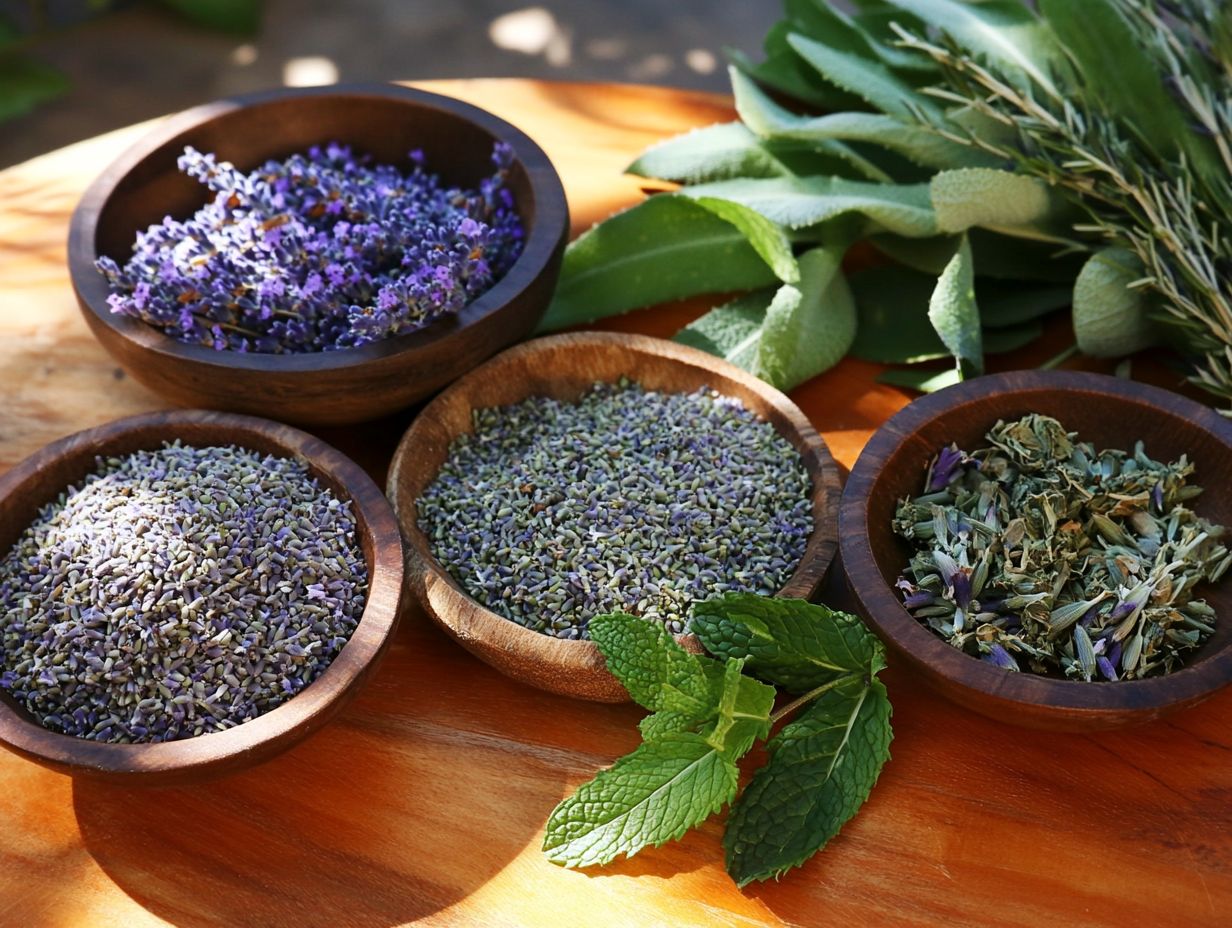
Acne is a common skin condition that can cause both emotional turmoil and physical discomfort. You may find solace in herbal remedies like turmeric, neem, and chamomile. These herbs have effective antibacterial properties that support treatment.
These natural ingredients do more than just fight the bacteria behind acne; they help reduce inflammation and promote healing. For example, turmeric contains curcumin, known for its anti-inflammatory benefits. Neem has azadirachtin, a compound that helps fight bacteria. Chamomile is recognized for its soothing qualities, which can calm irritated skin and speed up healing.
Incorporating these herbs into your routine through topical applications or herbal infusions can be beneficial. Studies support their effectiveness, making them valuable alternatives and excellent complements to conventional treatments.
Eczema
Eczema appears as dry, inflamed skin that can be uncomfortable and visually distressing. Herbal remedies like aloe vera and calendula can offer soothing and healing properties to help alleviate your symptoms.
These natural agents provide impressive anti-inflammatory and moisturizing effects. Applying aloe vera gel directly to affected areas offers immediate relief by hydrating the skin while reducing redness and irritation. Likewise, gently massaging calendula oil into your skin promotes healing and creates a protective barrier against environmental irritants.
This holistic approach not only addresses the immediate discomfort of eczema but also nurtures long-term skin health. It enhances your overall sense of well-being while managing this condition.
Psoriasis
Psoriasis is a chronic inflammatory skin condition that can cause significant discomfort and embarrassment. You might find relief in herbal remedies like turmeric and various plant extracts, which can reduce inflammation and promote healing.
This condition appears as red, scaly patches on the skin, leading to both physical discomfort and emotional distress. Integrating herbal treatments into your skincare routine may serve as a natural alternative to conventional medications. Consider specific remedies such as:
- Aloe vera gel, known for its anti-inflammatory properties
- Chamomile, celebrated for its soothing effects
- Tea tree oil, famous for its antiseptic qualities
These options may positively impact your skin health. By targeting underlying inflammation and supporting your skin s natural healing process, these herbal alternatives can provide relief and enhance your overall quality of life as you navigate the challenges of psoriasis.
How to Use Herbal Remedies for Skin Conditions
Using herbal remedies for skin conditions allows you to explore various application methods, especially through topical formulations. Using herbs in natural skincare can easily fit into your skincare routine, maximizing their benefits and improving your overall skin health.
Methods of Application
Effective application methods for herbal remedies include topical treatments that you can customize for your unique skin needs, seamlessly integrating them into your comprehensive skincare routine.
These remedies come in various forms creams, oils, and natural soaps each designed to enhance your skin health in distinct ways. For instance, herbal creams provide deep hydration, while oils are rich in antioxidants. Natural soaps, infused with soothing botanicals like chamomile or lavender, gently cleanse and comfort your skin.
Incorporating these methods into a balanced routine is essential. Start with a gentle cleanse, then use targeted treatments tailored to your specific concerns. Consistency is key; this way, your skin can fully enjoy the nourishing benefits of these herbal applications, resulting in a radiant and healthy complexion.
Precautions and Side Effects
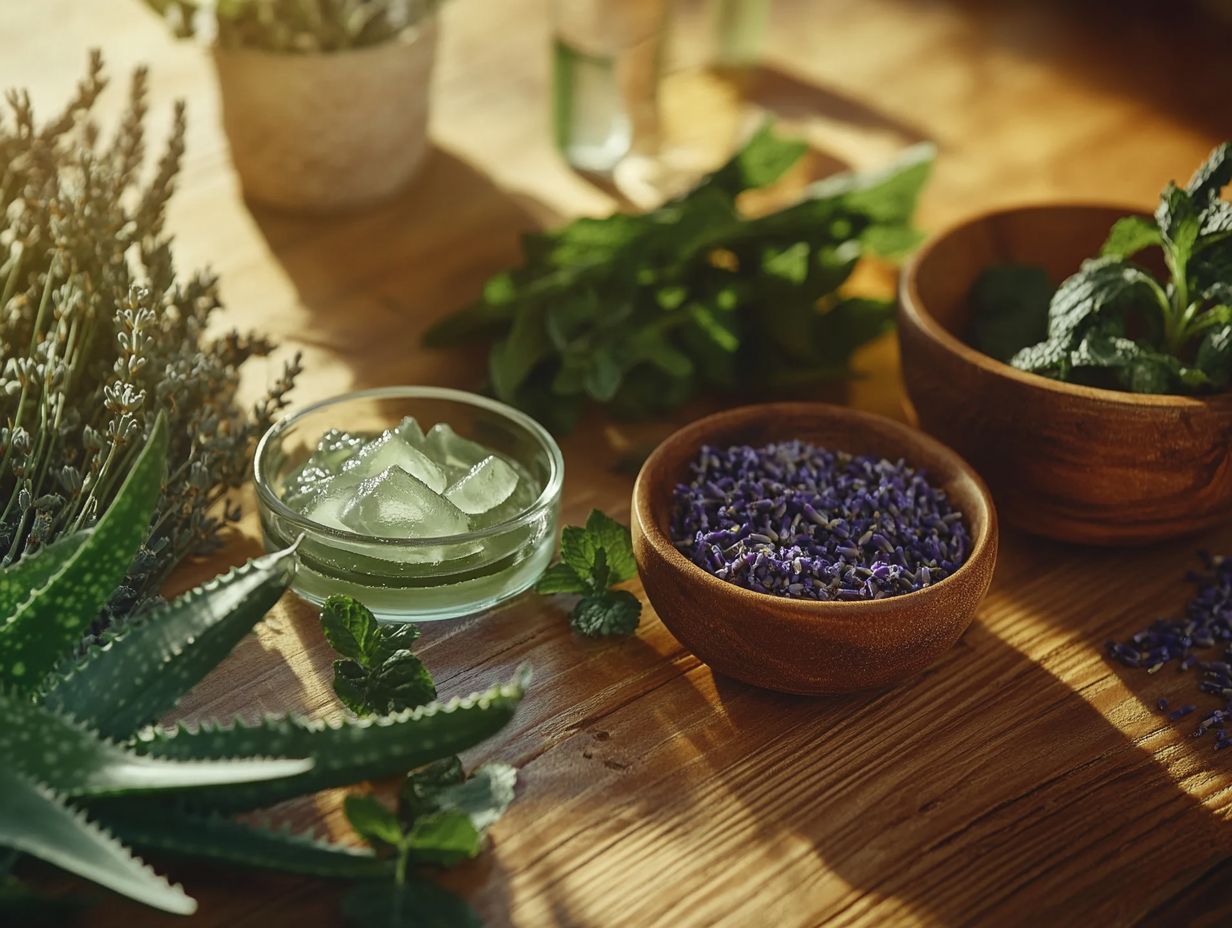
While herbal remedies can indeed offer benefits for various skin conditions, it s essential to be mindful of the necessary precautions and potential side effects. Consulting with a healthcare professional before diving in is a wise choice, ensuring your approach is both safe and effective.
Consulting with a Healthcare Professional
Consulting with a healthcare professional is crucial when you re considering herbal remedies. They can offer invaluable insights on safe usage and potential interactions with other treatments.
This guidance is especially important for those with existing health conditions or individuals currently on medications, as the world of natural products can be vast and occasionally unpredictable. A knowledgeable health advisor can help pinpoint which remedies might be most suitable for your specific skin concerns, ensuring that you achieve both effectiveness and safety.
Making informed decisions is essential, enabling you to understand herbal remedies better. This approach ultimately leads to healthier skin outcomes and an overall enhancement of well-being.
Possible Interactions with Medications
Herbal remedies can interact with certain medications, making it essential to discuss any potential risks with a healthcare professional to ensure safe usage.
Knowing about these interactions is key if you’re thinking about using natural products. Many people may not realize that even common herbs can impact the effectiveness of prescribed medications or worsen side effects.
For example, St. John s Wort is known to affect antidepressants, potentially reducing their effectiveness. Therefore, before you embark on your journey with herbal treatments, it s vital to have a comprehensive conversation with a pharmacist or doctor. They can provide personalized advice tailored to your specific health situation.
This proactive approach helps you make choices that prioritize your overall well-being.
Frequently Asked Questions
What are herbal remedies for skin conditions?
Herbal remedies for skin conditions are natural plant-based treatments used to alleviate symptoms. Many people are turning to herbs that promote healthy skin due to their minimal side effects and potential effectiveness.
What are some common types of herbal remedies for skin conditions?
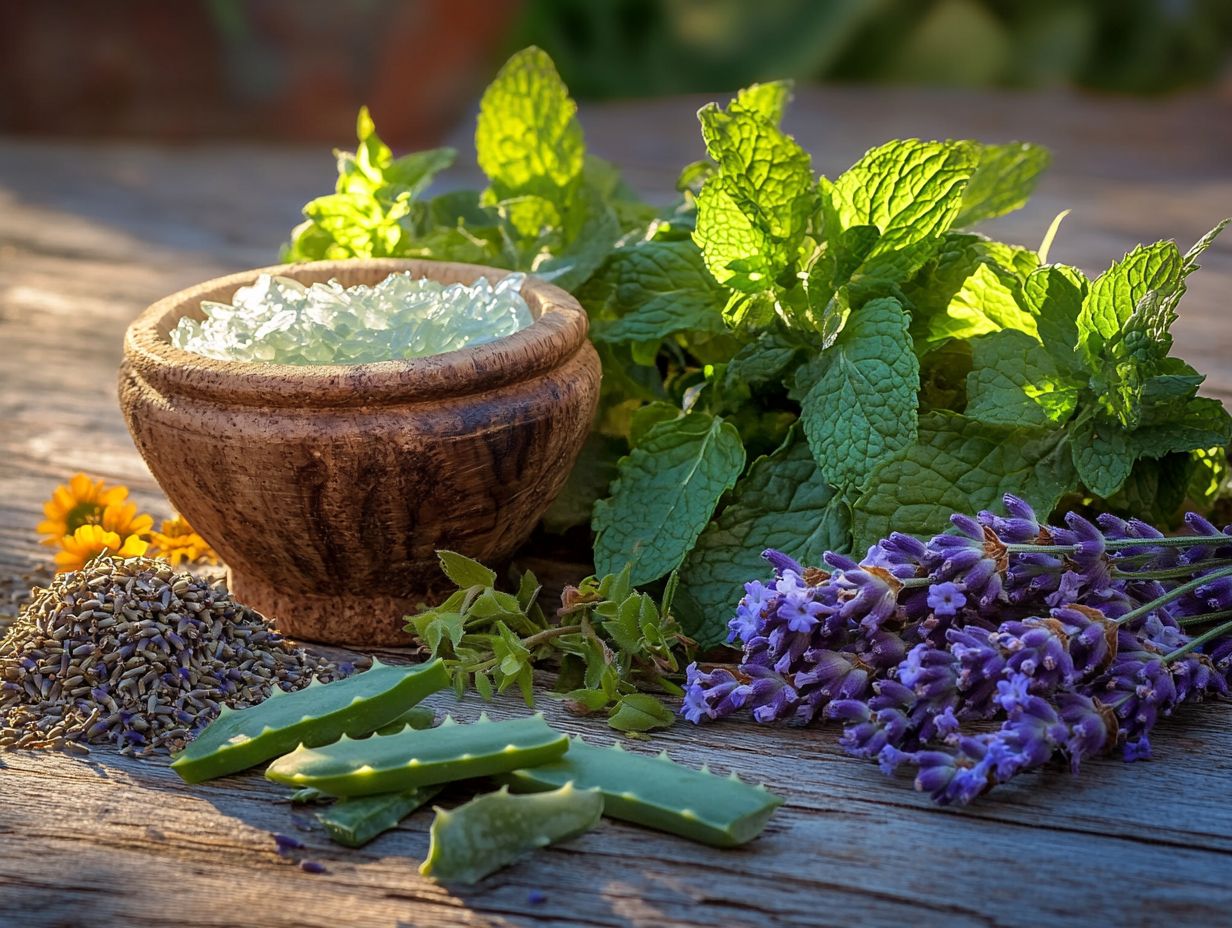
Common types of herbal remedies include aloe vera, tea tree oil, chamomile, and turmeric. These herbs have anti-inflammatory and antibacterial properties that can help soothe and heal skin conditions.
Are herbal remedies safe for all skin types?
While herbal remedies are generally safe for most skin types, it is important to do a patch test a small test on your skin to check for reactions before using them. Some herbs may cause allergic reactions or irritation in certain individuals, so it is best to consult with a healthcare professional before use.
Can herbal remedies completely cure skin conditions?
Herbal remedies may help alleviate symptoms of skin conditions, but they are not a guaranteed cure. They can provide relief and support the healing process, but it is important to consult with a healthcare professional for a proper diagnosis and treatment plan.
What are the benefits of using herbal remedies for skin conditions?
Herbal remedies are often preferred because they are natural and have fewer side effects compared to conventional medications. They can also be cost-effective and easily accessible.
What precautions should be taken when using herbal remedies for skin conditions?
Make sure to do your homework! It is important to research thoroughly and consult with a healthcare professional before using any herbal remedies. Pregnant or breastfeeding women, as well as individuals with chronic health conditions, should consult their doctor before use.




